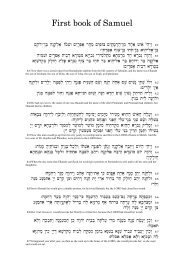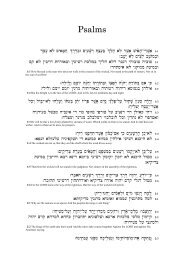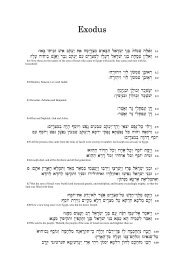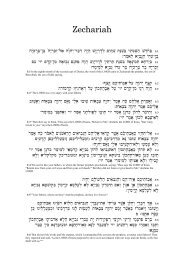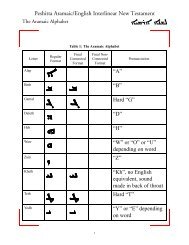Split Words - Peshitta Aramaic/English Interlinear New Testament
Split Words - Peshitta Aramaic/English Interlinear New Testament
Split Words - Peshitta Aramaic/English Interlinear New Testament
Create successful ePaper yourself
Turn your PDF publications into a flip-book with our unique Google optimized e-Paper software.
Now, it just so happens that the <strong>Aramaic</strong> could be translated both ways.<br />
“In <strong>Aramaic</strong>, the future tense can also be used as an exortation (like in the Lord's Prayer, "...Let your kingdom<br />
come; Let you will be done...". Guess what we find in 1st Corinthians 15:49?<br />
1 Corinthians 15:49:<br />
TEXT: "we shall also wear the image of the heavenly One."<br />
EVIDENCE: B I 630 1881 Lect syr(p) cop(south)<br />
TRANSLATIONS: KJV ASV RSV NASV NIV NEB TEV<br />
RANK: C<br />
NOTES: "let us also wear the image of the heavenly One."<br />
EVIDENCE: p 46 S A C D G K P Psi 33 81 104 614 1241 1739 2495 Byz lat vg cop(north)<br />
TRANSLATIONS: ASVn RSVn NASVn NIVn TEVn<br />
Not blatantly obvious, but evidence<br />
” – Steve Caruso<br />
It all depends on how the verb $bln (NeLB’aSH) is translated.<br />
“To understand whether this should be translated "we shall" or "let us" you would have to look at the grammar of<br />
the verb in the verse. For instance 'akha' means 'brother' but as soon as you change that 'a' ending to an 'i' ending<br />
you have 'akhi' and that means 'my brother and when you change the 'a' ending to an 'ay' ending you have 'akhay'<br />
meaning 'my brothers' or 'my brethren'.<br />
The verb is Common Gender, First Person, Plural (hence the 'we' in 'we shall' or the 'us' in 'let us'. The Suffix<br />
Number is Singular, the Verbal Tense is Imperfect (incomplete, ongoing action), and the Verbal Conjugation is<br />
PEAL (the most direct-action verb in <strong>Aramaic</strong> kinda like Qal or Kal is the most direct-action verb in Hebrew,<br />
hence 'shall' in 'we shall' or the 'let' in 'let us'.” – Larry Kelsey<br />
Acknowledgements: Thanks to Steve Caruso for this split word and thanks to Larry Kelsey for the grammar<br />
explanation.<br />
16. Whatsoever place or as many as? – Mark 6:11<br />
This split word is very interesting, as the two main families of Greek texts, Byzantine and Alexandrian, seem to be<br />
split right down the middle. In this verse, the Byzantine texts tend to refer to places, while the Alexandrian texts<br />
tend to speak of people.<br />
The ASV says: “And whatsoever place shall not receive you, and they hear you not, as ye go forth thence, shake<br />
off the dust that is under your feet for a testimony unto them.”<br />
The YLT says: “and as many as may not receive you, nor hear you, going out thence, shake off the dust that is<br />
under your feet for a testimony to them; verily I say to you, It shall be more tolerable for Sodom or Gomorrah in a<br />
day of judgment than for that city.'”



